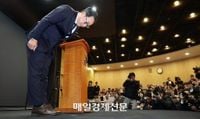The United States and South Korea have embarked on a significant journey towards enhancing their trade relationship, as both nations agreed to pursue "expedient and meaningful" progress in achieving "reciprocal and balanced" trade. This agreement was reached during a bilateral meeting held in Washington on April 24, 2025, between USTR Jamieson Greer and Ahn Duk-geun, South Korea's Minister of Trade, Industry and Energy.
The meeting, which was described as "productive," focused on the priorities set forth by President Trump's America First Trade Policy. Both sides recognized the importance of advancing their trade discussions, especially as South Korea seeks exemptions and exceptions from the Trump administration's tariffs.
In the readout provided by the U.S. Trade Representative's office, it was emphasized that the two ministers directed their teams to engage in technical discussions starting next week, on April 28, 2025. Greer also noted his upcoming attendance at the Asia-Pacific Economic Cooperation (APEC) meeting scheduled for May on South Korea's southern resort island of Jeju.
On the same day as their bilateral meeting, Ahn and Greer participated in "two plus two" consultations alongside Seoul's Finance Minister Choi Sang-mok and U.S. Treasury Secretary Scott Bessent. The Treasury Department highlighted Bessent's positive assessment of these discussions, noting that he welcomed South Korea's proactive engagement with the United States following President Trump's call with Acting President Han on April 8.
During the high-level talks, the two countries agreed on joint efforts to develop a comprehensive package agreement addressing U.S. tariffs and bilateral economic cooperation before the temporary pause on reciprocal tariffs expires on July 8, 2025. This agreement, referred to as the "July Package," aims to address both tariff and non-tariff issues collectively.
In addition, the two nations outlined their future discussions to focus on four primary categories: tariff and non-tariff measures, economic security, investment cooperation, and currency policies. Working-level talks on these issues are set to commence next week, with the U.S. planning to negotiate with about 18 major trading partners over the next couple of months.
Meanwhile, in a separate but significant development, SK Telecom has announced that it will replace the USIM cards of all 25 million subscribers for free starting April 28, 2025. This decision comes in the wake of a hacking incident that led to the leakage of subscriber information. Yoo Young-sang, CEO of SK Telecom, publicly apologized for the breach during a briefing on strengthening customer information protection measures.
The hacking incident has raised serious concerns about data security and customer privacy, prompting SK Telecom to take immediate action to safeguard its users' information. The company is committed to implementing robust security measures to prevent such occurrences in the future.
In the broader context of U.S.-South Korea relations, the agreement on the "July Package" reflects both countries' desire to enhance their economic ties, particularly in light of the upcoming presidential election in South Korea. This development is expected to play a crucial role in shaping the trade landscape post-election, especially with automobile and steel tariffs being key points of discussion.
As South Korea prepares for its presidential election in June, political pressures are expected to intensify regarding win-win finance and economic policies. Former Democratic Party Chairman Lee Jae-myung, a leading candidate, has pledged to develop a fourth smart new city in the Seoul metropolitan area aimed at providing housing solutions for the homeless and easing redevelopment barriers.
In the financial sector, the four major financial groups in South Korea—KB, Shinhan, Hana, and Woori—reported a remarkable net profit of nearly 5 trillion won in the first quarter of 2025, marking a record high despite low interest rates. This surge in profitability underscores the resilience of the South Korean financial industry amidst challenging economic conditions.
On the international front, Beth Hammack, president of the Federal Reserve Bank of Cleveland, hinted at the possibility of a rate adjustment after June, marking the first indication this year from a Federal Open Market Committee member regarding potential changes in interest rates. This statement adds another layer of complexity to the economic discussions between the U.S. and South Korea.
As the two countries continue to navigate their trade relationship, the outcomes of the upcoming negotiations and the political landscape in South Korea will undoubtedly influence the future of U.S.-South Korea economic ties. With both sides committed to fostering a balanced and reciprocal trade relationship, the next few months will be crucial in shaping the direction of this partnership.
In conclusion, the recent developments in U.S.-South Korea relations signal a proactive approach towards enhancing trade and economic cooperation, while also addressing pressing domestic issues such as data security and housing. As both nations work towards finalizing the "July Package," the implications for bilateral trade and investment are significant, promising a more interconnected economic future.

